#interview: huffington post canada
Text
The Art Of Kindness Podcast Celebrates 100th Episode With Carol Burnett

So much of this world is a dumpster fire trapped in quicksand, surrounded by toxicity. Occasionally, however, the world harmonizes around a worthy and valued objective.
In this case, it's kindness.
Consider this. November 13 is World Kindness Day. Then consider that The Art Of Kindness (AOK) podcast is celebrating its 100th episode on World Kindness Day. Then note that the guest on AOK's 100th episode is Carol Burnett, a paragon of kindness.
This is a welcome and rare event. It's like driving around Manhattan for a parking space and one opens up just as you're driving by. What!
Let's take these events in order.
First, The Art Of Kindness podcast is a "a positively star-studded podcast that converses with and celebrates artists from all areas of the entertainment industry (Film, TV, Broadway etc.) who use their platform to make the world a better place. AOK sprinkles positivity around like confetti and get to the bottom of what kindness really means. It is part of the Broadway Podcast Network.
In every episode, host Robert Peterpaul elicits tales from Broadway people about how they sprinkle kindness throughout their world. Peterpaul always asks each guest, "What does kindness mean to you?" He also asks guests how they react to people praising them.
Previous guests have ranged from Grammy-winner Meghan Trainor to Olympian Laurie Hernandez to Tony Award winning Broadway stars like Lin-Manuel Miranda and Jessie Mueller.
Robert Peterpaul is an award-winning actor, writer and celebrity interviewer with a passion for storytelling and spreading kindness. A New Jersey native, he has also been a writer for over a decade, writing for major publications and shows such as NBC’s America’s Got Talent, Screen Rant, The Huffington Post, Backstage, Casting Networks, Writer’s Weekly, and HOLA! USA, where he was the Head Weekend Editor for six years.
Most importantly, Robert Peterpaul is intent on giving back. It's not just rhetoric for the podcast.
Second, World Kindness Day is an international observance on November 13. It was introduced in 1998 by the World Kindness Movement, a coalition of nations' kindness NGOs. It is observed in many countries, including Canada, Australia, Nigeria and the United Arab Emirates. Singapore observed the day for the first time in 2009.
The theme of this year's Kindness Day is "Acts of kindness start a ripple of change that can transform the lives of children, families, and entire communities."
Third, TV legend Carol Burnett is Peterpaul's guest for his 100th episode on World Kindness Day.
About Burnett being on his podcast, Peterpaul says, “To me kindness is an action. It’s using your time on this earth to make someone else’s life brighter. Carol Burnett has done that a million times over for us all. She has woven the most beautiful legacy of kindness in the arts, making her a dream guest for The Art Of Kindness podcast’s 100th episode. I’m beyond grateful and still can’t believe it even happened!”
Carol Burnett's resume dazzles with achievement. Her longtime CBS hit program, The Carol Burnett Show - which ran from 1967 to 1978 - garnered 25 Primetime Emmy Awards and earned a spot on Time magazine's "100 Best TV Shows of All Time." Burnett has received numerous accolades including six Primetime Emmy Awards, a Tony Award, A Grammy Award and eight Golden Globe Awards. Burnett was awarded the Presidential Medal of Freedom, the Mark Twain Prize for American Humor, the Screen Actors Guild Lifetime Achievement Award, is a Kennedy Center honoree, and has been inducted into the Television Hall of Fame.
Check out this 100th episode of The Art Of Kindness. You'll be treated to a gracious host who promotes kindness instead of grievance, interviewing a woman who has exuded kindness her entire career.
Don't forget. It's World Kindness Day.
1 note
·
View note
Text
Tessa And Scott Share Their Deepest, Darkest Food Secrets
Including what they like to eat on a first date.
May 10, 2019
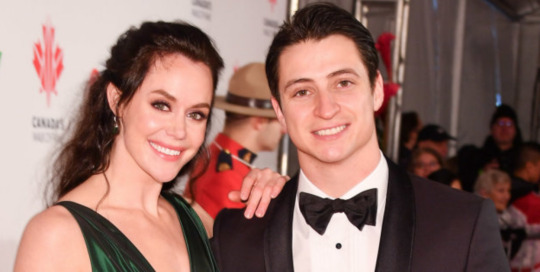
GEORGE PIMENTEL VIA GETTY IMAGES
Tessa Virtue and Scott Moir attend 2018 Canada's Walk Of Fame Awards held at Sony Centre for the Performing Arts on Dec. 1, 2018 in Toronto, Canada.
Canada's favourite ice-dancing duo, Tessa Virtue and Scott Moir, have taken a break from competing, which leaves them with more time to share their thoughts and dreams with us. Ahead of Mother's Day, the stars talk about family traditions and all things food. Mostly because food is life, and family is life, and these figure skating life forces also happen to be spokespeople for the food delivery service, HelloFresh. So, there you go.
Do you have a Mother's Day tradition you remember fondly?
Scott: We like doing big family dinners at home with the entire family including all the nieces and nephews. Since there are a lot of us, we normally do a roast beef or a whole chicken. We're an old Scottish farm family.
Tessa: My grandmother used to make the most incredible chicken divan, and my mom has carried out that tradition. It's my comfort food. It's amazing how you can almost taste the memories with a dish like that! And the more leftovers, the better.
Between both of you, who is the better cook?
Scott: That depends! I'm better at doing the prep. Tessa chopping things up is a little scary! But Tessa is very detail-oriented, plus she is a perfectionist, so she is really good at putting (things) together. I have always enjoyed cooking, so I'd like to think I have the advantage.
Tessa: I leave the cooking to Scott. When I do make something, though, he has to hear all about it because I'm quite proud of myself.
Since you have stopped competing, what do you do with your saved time?
Scott: Since we have stopped competing, I have less time (because) I'm taking on more things. Being an Olympic athlete is a "selfish" thing where you only do things that help you be the best athlete possible. Now I am trying to be a more well-rounded person, a contributing member of my family. Being a part of their lives is super important to me so when I'm home, I want to make it count and spend more time with my family, connect with the people I love.
Do you cook for anyone else in your life?
Scott: I do! I don't have a ton of time at home, but when I'm home, I've really enjoyed being able to cook for my parents. The biggest thing for me is cooking for my girlfriend. We don't get as much time together as we like so if I can show up with a home-cooked meal, it's a nice moment together. It shows how much I care. It's also super fun to cook the meals together.
Tessa: I try to cook for family when I'm home, but I'm not yet confident enough to throw big dinner parties.
What do you usually drink with your meals? What's your summer drink?
Scott: Depends. I try to pair wines. By that I mean I follow the old rule: if I have red meat, I'll have a glass of red wine, and white wine with fish or chicken. I'm getting back in shape so I am trying not to drink. (Everything) in moderation! I'll have a glass of wine while cooking, but with my meal I'll just have water.
I'm getting more into refreshing cocktails. In the summer, a nice gin and tonic or vodka soda infused with something. I also really like iced tea. Like old-fashioned ones without sweetener.
Tessa: Now that I'm not competing or training so much, I'll have a glass of wine, or maybe a gin and tonic (especially in the summer). It always makes the process of cooking more relaxing!
Do you ever compete with each other to see who's the better cook?
Scott: Tessa is getting more confident in the kitchen, so I think she'll be anxious to step up and prove herself.
What food-related fact about you would shock your fans?
Tessa: Given my travels, I've learned to be more open and feel much more comfortable experimenting with food. Often when I'm in Japan, I'll just sit at a sushi bar and have them bring whatever's fresh. Recently, I started liking olives and oysters (not together, haha). That makes me feel much more mature!
What advice do you have for fans trying to eat a more balanced diet?
Tessa: Setting attainable goals from the start really makes a difference. I always feel like when I start my day with that kind of purpose, things fall into place more naturally. I drink hot water and lemon every morning. Generally though, I like to give myself the ability to be balanced and avoid total deprivation of any kind. After all, we all deserve some treats every now and then!
Favourite snack/meal for ...
The beach
Scott: I'm a sandwich guy.
Tessa: Fresh fruit.
A picnic
Scott: I like a charcuterie board and a nice bottle of wine.
Tessa: Cheese and crackers.
Before competing
Scott: Something bland. Chicken taco or chicken sandwich. I like to feel the heaviness of the protein, so I will keep it bland.
Tessa: Toast with peanut butter.
The movies
Scott: I'm not a snacker at the movies. I like dinner before. Candy and popcorn make me feel sick, so I guess I'm not very much fun at the movies! I can fake it though, for the first date!
Tessa: Milk Duds.
A first date
Scott: Maybe BBQ or Ribs? Food is such a big part of my life, so I need to be with someone who also enjoys food. Someone who is adventurous and will try as many things on a menu.
Tessa: Pizza.
A dinner party
Scott: I like dips, apps. Nothing specific, but a buffalo chicken dip is fun.
Tessa: Champagne.
—Huffington Post Canada
#tessa and scott#off ice#interview: huffington post canada#sponsorship#hellofresh#when they hold up a mirror what do they see
144 notes
·
View notes
Text
Yuricon Celebrates 20 Years with Free Virtual Event
Yuricon, the organization founded by Erica Friedman with the mission of bringing together fans of lesbian images in Japanese animation and comics together is celebrating its 20 year anniversary. The organization announced that it would be holding a free virtual event discussing global Yuri fandom on August 14, 2021.

The event, which is based on a similar event held during the Mechademia International Academic Conference, will see three panelists discussing Yuri and its fandom across the globe. The event is free but there is limited space. Attendees can register online at https://www.yuricon.com/essays/yuricon20th/
The speakers to be featured during the event are:
Verena Maser:
Verena has a PhD in Japanese studies and work primarily as translator of manga and anime from Japanese to German, including Citrus and Yuri is My Job.
No Place for Lilies? Yuri’s Rocky Road to Germany
Ever since the 1990s, manga have seen enormous success in Germany, easily outselling any other form of graphic storytelling. Yet to this day, not all genres are created equal. While fantasy and boys love are thriving, yuri has had to face far more challenges and seen far fewer successes. My talk will trace these challenges both from the angle of the overall market situation, as well as from a linguistic angle, as I myself have translated several yuri manga to German.Nevertheless, their translation remains a challenge as stories often rely on shared tropes like being set at an all-girls’ school and featuring an “older sister” type paired with a “younger sister” type. Such tropes often have to be rewritten or even erased in translation. This includes the term “yuri” itself, as the lily symbolism is not understood by all audience members and German publishers prefer the term “Girls Love”.
James Welker
James Welker is a professor at the University of Kanagawa. He researches queer cultures, feminisms, & popular culture, in modern & contemporary Japan, including Boy’s Love in Japan/Asia. He is an editor of and contributor to Queer Transfigurations: Boys Love Media in Asia (Collaboration) 2021 Boys Love Manga and Beyond: History, Culture, and Community in Japan, Rethinking Japanese Feminisms, and Queer Voices from Japan.
The Yuri Genre in Its Transnational Permutations
Yuri, that is, manga, light novels, anime, and related media depicting female–female romantic intimacy, has always been a transnational genre. In addition to the genre’s early twentieth century roots in always already transnational Japanese girls fiction (shōjo shōsetsu), Yuricon was an early Yuri event.While yuri remains a relatively minor genre domestically and globally compared with BL, yuri subevents have been held within larger fan events in Europe, North America, and Latin America, and yuri-only events have been held regularly in both Taiwan and Korea for the past several years. Drawing on participant observation since 2013, in this presentation I discuss yuri-only events in Japan (Girls Love Festival), Korea (Our Lily Festival), and Taiwan (ComicHorizon), yuri subevents in Canada (Yuri North and Yurithon), and other fan events at which yuri works have been present including Tokyo’s Comic Market and Comitia, and BL events in Southeast Asia. I focus on ways that yuri has been transformed in various contexts, as well as links to local LGBTQ cultures.
Moderator – Erica Friedman
Erica Friedman is the Founder of Yuricon. Erica has written about Yuri for Japanese literary journal Eureka, Animerica magazine, the Comic Book Legal Defense Fund, Dark Horse, and contributed to Forbes, Slate, Huffington Post, Hooded Utilitarian, and The Mary Sue online. She has written news and event reports, interviews Yuri creators and reviews Yuri anime, manga and related media on her blog Okazu since 2002 and is the author of By Your Side: The First 100 Year of Yuri Anime and Manga, coming out in June 2022 from Journey Press.
Love Online – Global Yuri Fandom Speaks For Itself
The term yuri, is both descriptive and divisive, shaped by creators, publishers and by different audiences within fandom. The story of yuri as a genre is the story of a global online fandom, which absorbed, adapted, and regurgitated Japanese words and concepts associated with the genre. Non-Japanese, English-language yuri fandom developed relatively cut off from both Japanese otaku communities and LGBTQ communities in Japan and abroad.
I will trace the arguments, the compromises, the failures and triumphs of the growth of this fandom from a first-person perspective, from small groups online in the late 1990s, through the development of yuri as a manga and anime genre legitimized by publishers and creators in both the West and Japan, by identifying and discussing the terms that were and are being used by that fandom.
Yuricon was founded in 2000 under the name AniLesboCon, with the mission of bringing together fans of lesbian narrative in Japanese animation and comics to discuss and create stories that represented an entire continuum of lesbian experience. In 2001, the community was rebranded as Yuricon, to better represent the mission: to celebrate Yuri in anime and manga and to remember the ties to the lesbian community through the Yurizoku. Yuricon community members participate in panels, write articles, and conduct lectures all over the world, in order to expand the global Yuri community.
YuriMother is not affiliated with the event of Yuricon, however, Nicki "YuriMother' Bauman will be in attendance at the event.
48 notes
·
View notes
Link
In a candid conversation with the Star, Manji said “Schitt’s Creek” producers did not instruct him as to how Ray should sound.
“It is a very slight Indian accent — somebody who was probably raised in Canada, but probably was born in India or Pakistan,” he said from his home in Los Angeles.
“I don’t regret that because I think it actually works for Ray. He wasn’t like everybody else in that town. He was from somewhere else.”
Manji said he’s OK with viewers questioning his choices, but rather than focus on accents, he said, critics could ask why his character didn’t have a more fully developed story, like a relationship or a family.
“If you want to criticize something, do that,” he said. “We need to have three-dimensional characters.”
[full article text below the cut]
At the start of Rizwan Manji’s acting career in the 1990s, the only roles available to him were those playing convenience store clerks and cab drivers. The parts usually required him to fake an Indian accent — just for laughs.
“We would joke about it. ‘This is so offensive, this is so offensive,’” recalls the Toronto native. “It’s not like we didn’t know.”
More than two decades later, Manji’s grin-and-bear-it perseverance has paid off. At 46, Manji now boasts a long — and diverse — list of TV and film credits. In September, he joined castmates from the hit CBC comedy series “Schitt’s Creek” in celebration as the show nabbed a record-breaking nine Emmy Awards.
That doesn’t mean, however, he still doesn’t grapple with questions about his acting choices.
While “Schitt’s Creek,” about a wealthy family that loses its fortune and is forced to move to a backwater town, won raves for its messages of inclusivity and positive queer representation, a segment of viewers took to social media to criticize Manji’s character, Ray Butani, the town’s bumbling jack of all trades — who speaks with an accent.
What irked them was that Ray, one of the few recurring people of colour on the show, seemed like a caricature — a rehash of the stereotypical, emasculated South Asian male. They also complained that Manji’s accent came across as “cringey.”
“Why go to the effort of writing in a character with an Indian name, played by an Indian actor, whose main personality trait is that he is stupid and has an accent?” Rishi Maharaj, a Port Hardy, B.C., engineer and avid TV viewer, wrote on Twitter days after the show’s Emmy sweep.
Across North America’s TV and film industry, there is broad consensus about the need to fight stereotypes and offensive tropes in casting. But the debate among actors of colour over whether they should fake accents remains fraught.
Some Hollywood actors, such as Aziz Ansari and John Cho, have reportedly turned down roles, citing the history of Hollywood playing up accents for laughs. (Think Mickey Rooney’s portrayal of Mr. Yunioshi in the 1961 romantic comedy “Breakfast at Tiffany’s,” complete with taped eyelids, buck teeth and cartoonish accent).
They worry that parts requiring them to speak with accents do nothing to help the cause of minority actors who are often typecast in secondary roles or as sidekicks, and who continue to be under-represented on TV and film.
Others say it’s important to represent linguistic diversity and see no harm portraying characters who speak in broken English, as long as their accent is not the butt of a joke and in keeping with a character’s backstory.
In a candid conversation with the Star, Manji said “Schitt’s Creek” producers did not instruct him as to how Ray should sound.
“It is a very slight Indian accent — somebody who was probably raised in Canada, but probably was born in India or Pakistan,” he said from his home in Los Angeles.
“I don’t regret that because I think it actually works for Ray. He wasn’t like everybody else in that town. He was from somewhere else.”
Manji said he’s OK with viewers questioning his choices, but rather than focus on accents, he said, critics could ask why his character didn’t have a more fully developed story, like a relationship or a family.
“If you want to criticize something, do that,” he said. “We need to have three-dimensional characters.”
The character that has generated one of the most heated debates in recent years when it comes to accents is Apu, the Indian-American shopkeeper on the long-running animated series “The Simpsons.” Until recently, the thick-accented character was voiced by actor Hank Azaria, who is white.
In 2017, American comedian Hari Kondabolu came out with a documentary, “The Problem With Apu,” in which he pressed the case that the show fomented racial stereotypes about Indian people.
In interviews at the time, Kondabolu shared that, as a kid, Apu was “the only Indian we had on TV” and that he was happy for “any representation.” But then on the playground, he had to deal with kids mimicking Apu’s accent.
In the documentary, he gets Dana Gould, a former writer on the show, to admit, “There are accents, that by their nature, to white Americans, sound funny. Period.”
With criticism mounting, Azaria, who had voiced Apu for three decades, announced he was stepping away from the role, telling the New York Times earlier this year: “Once I realized that that was the way this character was thought of, I just didn’t want to participate in it anymore.”
There is growing sensitivity among artists, writers, directors and producers to avoid stereotypes and invest in “fully humanized, realized characters,” Steven Eng, an actor and voice and speech instructor at New York University, told the Star.
“There’s certainly been a whole history — that I don’t think any of us can deny — in film and television and the theatre where characters were stereotyped,” he said. “I think there’s so much more awareness, so much more determination to not go that route.”
But even “groundbreaking” shows, such as “Kim’s Convenience” and the recently cancelled “Fresh Off the Boat,” which were heralded for elevating Asian-Canadian and Asian-American visibility and immigrant experiences, have not escaped criticism, accused by some viewers of employing storylines and accents that do not ring true.
Cast members, in turn, leapt to the defence of their shows — and their accents.
“Some people are like, ‘Oh, stereotypical accent!’” Constance Wu, lead actress on “Fresh Off the Boat,” told Time magazine regarding her character’s Taiwanese accent. “An accent is an accent. If there were jokes written about the accent, then that would certainly be harmful. But there aren’t jokes written about it. It’s not even talked about. It’s just a fact of life: immigrants have accents.”
Paul Sun-Hyung Lee, the lead actor in “Kim’s Convenience” told Maclean’s his character’s Korean accent is “part of who he is, but it isn’t the joke.”
“Yes, we’re in the entertainment field, and we will mine some of that because it is situational humour. You will get a point where we’ll say, ‘Here’s where some fun can be made, playing with the accent, and his inability and people mishearing what he says.’ But at the same time, that’s not all it is,” he said.
Jimmy O. Yang, who starred in the HBO series “Silicon Valley” and whose character spoke with a heavy Chinese accent, told Huffington Post the key is to portray immigrants with humanity.
“It’s maybe a better thought to change the perception of an accent than to avoid it all together,” he said. “I take offence (when people don’t go for parts with accents) ― it’s like saying, ‘I’m better than my immigrant brother with an accent.’”
Yang added he drew inspiration from his mom and relatives in Shanghai to develop his accent for the show. “It’s not just a (lousy) impression of a Cantonese Bruce Lee accent.”
Still, some actors have declared outright they will not do it.
“For me, personally, any time I’ve been asked to do that, I feel like — it feels like it’s making fun of people that have that accent if I do it and don’t have that voice,” comedian Aziz Ansari told NPR in 2015, years before he faced a public allegation of sexual misconduct.
“It feels like you’re doing it so white people can laugh at Indian people,” he said at the time.
That’s kind of how Maharaj felt watching Ray on “Schitt’s Creek.”
“I did find it cringey. The first thought that came to mind was it reminded me of Apu in ‘The Simpsons,’” he told the Star.
In The Problem With Apu, South Asian-American comedian Hari Kondabolu confronts his long-standing “nemesis” Apu Nahasapeemapetilon – better known as the Indian convenience store owner on The Simpsons. Creator and star Kondabolu discusses how this controversial caricature was created, burrowed its way into the hearts and minds of Americans, and continues to exist – intact – nearly three decades later. Featuring interviews with Aziz Ansari, Kal Penn, Whoopi Goldberg, W. Kamau Bell, Aasif Mandvi, Hasan Minhaj, Utkarsh Ambudkar, Aparna Nancherla
“To me what it sounds like is what a person from Saskatoon thinks a person from India sounds like. ... I’m sure he could’ve been a funny part of that show without an accent.”
Maharaj wasn’t alone. Arif Silverman, an actor and playwright in New York, posted a lengthy Facebook post in October sharing his conflicted feelings about the show.
“Schitt’s Creek has become one of my all-time favourite shows. But they did their South Asian characters dirty,” he wrote.
“Especially Ray, who plays directly into the racist South Asian trope of being an emasculated, goofy buffoon who no one takes seriously, not least in part because of his accent.”
Silverman told the Star Ray’s accent seemed “part of the joke” and struck him as a “betrayal” from a show that preached inclusivity and whose main romance was a gay love story.
“I’m half South Asian — my mother is from Bangladesh. … And so I think a lot about representation of South Asians in the media,” he said. “If you’re really going to talk about inclusivity it can’t be at anyone’s expense.”
Manji says he faced a lot of struggles as a brown actor at the start of his career.
Back then, he was often pigeonholed into narrow roles, such as the cabbie or 7-Eleven store clerk. One hundred per cent of his roles required him to fake a South Asian accent.
“It was very strictly, like, the joke was on the accent,” he said.
But he accepted the parts because he needed the work.
He did draw a line with one type of role.
“I’m Muslim, so I was more the guy who was like, ‘I’m not being the terrorist.’”
There was one time, however, when he auditioned to play an Islamic Studies professor on the show “24.” He was given limited information about the character. It turned out he was a bomb maker.
But the money was too good to pass up. He took the part.
“I rationalized it in my head, ‘Oh, it’s season 8, and they have good Muslim characters. … I don’t know if I made the right decision,” he said.
“To be clear, I’m OK with being the bad guy. I’d love to play the bad guy. It’s just when it’s this kind of thing where you’re screaming ‘Allahu akbar’ and bombing people.”
In 2010, Manji was cast in the short-lived NBC sitcom “Outsourced” set in an Indian call centre. He and his castmates employed accents, which some critics derided for lack of authenticity.
It’s fine if people want to criticize the quality of the accents, he said, but it wouldn’t have made sense for these characters not to have accents.
“The show was shooting in America about living in India. I don’t know what the other option was,” he said, adding that he channelled his father in developing the accent for that show.
Another thing to keep in mind is that accents have to be understandable to North American audiences, Manji said. For instance, during the filming of the movie “Charlie Wilson’s War,” Manji, who played a Pakistani colonel, said he settled on a “sweet spot” where his accent “sounds foreign” but is “not so thick that it becomes comedic or unintelligible.”
Manji said he did not have to audition for “Schitt’s Creek” but was offered the role of Ray, the town’s real estate agent, travel agent, photographer and Christmas tree salesman.
When he went for his first table read in Toronto, he’d had no prior discussion with the show’s writers or producers about what Ray would sound like.
Because most of his demo tape consisted of his work on “Outsourced,” Manji assumed that was the kind of voice producers were looking for. He went with a slightly toned-down version.
“Afterwards, I went up to Dan (Levy, the show’s co-creator) and said, ‘Hey just want to check in.’ He said, ‘I love what you did. It was funny.’ That ended up being the character for six years.”
Maharaj says he can’t help but feel Manji was selling himself short — playing to what he thought “a white audience might expect or respond more favourably to” to get the job. He likens it to job applicants of Asian descent who anglicize their names on resumes.
“I’m encouraged to hear he had agency, that they weren’t like, ‘We need you to do the accent,’” he said.
“I’d feel better if they were asking him to do a British accent or Brooklyn accent because if you’re doing this Indian accent and the character is comedic, it is nonetheless playing into that trope.”
Levy, who is also from Toronto, declined an interview request. Instead, he released a statement through his publicist.
“Ray was conceived as a character of Indian decent which we cast with Canadian-born actor Rizwan Manji, who is of Indian decent. No accent was called for in the casting or specified in the scripts,” it said.
“The thoughtful choices that Rizwan made in his portrayal in the audition room perfectly encapsulated the warmth and the energy of Ray. All characters on our show were created with love, respect and humanity. It has been gratifying to have these intentions reflected through the overwhelming audience support for these characters. That said, I welcome any perspectives that encourage conversations about diversity, especially in entertainment.”
Despite what critics might think, Manji said he has felt more empowered in recent years to make creative decisions about his characters.
Manji, who had a role in NBC’s musical comedy “Perfect Harmony,” which was cancelled this year, said when he was approached about playing the part of a pastor, he was the one who initiated the idea of giving the character a foreign accent.
Because the character was raised by missionaries, it wouldn’t have made sense for him to not have one.
Conversely, when he was asked a couple years ago to read for a pilot for a dramatic series in which his character was a Muslim father he told the casting director he didn’t want to do an accent.
“I said, ‘You know what? I’d rather not. That’s not going to excite me about this part,’” he said.
“I ended up getting the job. I found my voice.” (The pilot never made it to series).
Manji, who guesses about 60 per cent of his roles in more recent years have involved accent work, says remarks by actors who refuse to do accents are “dangerous” because they could end up limiting the types of roles available to minority actors.
His worry is casting directors will go to India in search of authentic accents, overlooking North American-born actors, like him.
“I’m already marginalized.”
Nobody fusses when Meryl Streep performs with an accent, he adds.
Ishani Nath, a freelance entertainment and lifestyle journalist in Toronto, says anytime she sees an accented character who also provides comedic relief, it raises a bit of a red flag.
But she’s hesitant to criticize actors for taking those roles, knowing that opportunities are not easy to come by.
“I’m way more interested in criticizing writers, producers, (and asking): Why are you asking for these roles to be accented? … Is there an actual reason and backstory?”
Nath says she is starting to notice deeper conversations about how different cultures are represented on screen and what nuances can be added to make characters more complex.
She says a good example of this is the hit movie “Crazy Rich Asians,” whose actors exhibited a range of regional Asian accents.
“It’s important to note that the problem with accent roles isn’t the accents themselves — plenty of characters in ‘Crazy Rich Asians’ have accents, but no one has the exaggerated or generic ‘Asian’ accent that has historically been played for laughs in Hollywood,” she wrote in a 2018 article in Flare.
Jhanik Bullard, a writer and member of BIPOC TV & Film, a collective of Black, Indigenous and people of colour working in Canada’s entertainment industry, says it is no longer acceptable for characters to have accents “just because.”
“It should actually have an authentic origin as to why this character sounds the way they sound,” he said.
Audiences are also not as forgiving as they may have been in the 1990s if the accent sounds botched or inauthentic.
What is encouraging, he says, is that more doors are being opened for people of colour to tell their stories and there are more platforms for those stories to be to told.
To that end, Manji says he and his partners have initiated a handful of projects that are in various stages of development. One is a show about a Muslim guy who becomes mayor of a major city. Another is a sitcom about a “normal Muslim family” — something that “resembles me more.”
Does the character he envision for himself speak with an accent?
“Since I want it to be closer to me, then I would say not.”
#definitely a good discussion about ray and about riz's other roles and about south asian rep in general#schitt's creek#schitts creek#rizwan manji#ray butani#press#toronto star#long post
86 notes
·
View notes
Link
George Floyd’s name became a hashtag as soon as his brutal killing by police was caught on tape for the world to see. In the past two weeks, a new hashtag demanding justice for Floyd and all the other Black men and women killed by police has emerged. As a result, the #DefundThePolice movement has gone from a whisper to a thunderous roar, with influencers who usually post about matcha lattes and workout routines stumping for dismantling an institution that disproportionately kills Black people. And celebrities are signing petitions. Of course, Black activists have been yelling about defunding the police for decades (Angela Davis has been pushing for abolishing the police altogether since the ’60s) but now, the world is finally listening.
Activist Sandy Hudson founded Black Lives Matter Toronto and is the vice-chair of the Black Legal Action Centre and a UCLA law student. Last week, Hudson tweeted about being cut from a segment for CBC's The Current, after she brought up defunding the police in a pre-interview with a producer. This week, she's Canada's go-to expert on the subject. Hudson’s recent op-ed in The Huffington Post, titled “Defunding The Police Will Save Black and Indigenous Lives In Canada,” went viral. In it, she wrote, “defunding the police can free up funding that we can reinvest in services that provide real safety.”
Cities are already addressing public pressures to reexamine police funding. In Toronto, where Black people are 20 times more likely to be shot by police, city councillors announced a proposal to reduce the police budget by 10%. Right now, the biggest portion of Torontonians’ property tax bills go to police services. In most North American cities, the police get more money than education and childcare, and across Canada, mental health checks result in the deaths of Black people like D’Andre Campbell and Regis Korchinski-Paquet, and Indigenous women like Chantel Moore. “We need to say that Black lives are worth it. I don't think this goes far enough at all,” says Hudson of the 10% proposed cut. Small reductions like this one, she notes, are not defunding the police.
There’s been confusion about what defunding looks like, and why it’s so important. Here, Hudson shares what defunding the police actually means, why it’s been met with such resistance, and why the proposed cuts to the Toronto Police don't go far enough.
Let’s start with the basics. What does “defund the police” mean?
It means that we think the services that police provide can be better provided elsewhere. For example, there's no reason why the police should be the only emergency option to call when someone is having a mental health crisis. The police often show up with lethal force, and use that lethal force. If someone really needs medical assistance, social assistance, and de-escalation, the police have consistently shown that they are both unwilling and unable to provide that service appropriately. I don't know why we wouldn't create something new.
Continue Reading.
Tagging: @politicsofcanada @abpoli @torontopoli @onpoli
263 notes
·
View notes
Text
Interview with Maggie Szabo
We had the pleasure of interviewing Maggie Szabo over Zoom video!
Maggie Szabo is a Canadian singer-songwriter who has been winning over audiences worldwide with her stunningly soulful vocals and empowering pop anthems. Hailing from a small town in Ontario, Szabo is now an accomplished musician living in Los Angeles and is using her music to conquer social injustice.
After quickly becoming one of the most sought after songwriter/vocalists for DJs and notable film and TV placements, Szabo’s latest work has focused primarily on her solo project.
Szabo uses her music to conquer social injustice by working with organizations such as the Trans Chorus of Los Angeles. Her power ballad, ‘Don’t Give Up’, is a beautifully authentic and heartfelt song dedicated to transgender youth around the world who live in fear and suffer from rejection and exclusion. It was premiered by Billboard and praised by media outlets such as PopDust and Huffington Post. Proceeds from the song are donated to empowering homeless LGBTQ youth.
Szabo’s successes to date include over 15 million views on YouTube, over 15 million streams on Spotify, and extensive media coverage from high profile outlets such as Perez Hilton, Yahoo Music!, PopCrush and Huffington Post, as well as being featured on numerous notable film and TV projects on networks such as Netflix, Disney, ABC, E!, TV Land and NBC. She was the featured vocalist on the album for German electronic DJ Schiller, who has so far sold 7 million albums worldwide. Szabo's song 'Love Is Free' was hand-picked by Jennifer Hudson to be the song for her artist, Kennedy Holmes, on the season finale of The Voice on NBC. Her song, 'Home', was released with DJ Madison Mars and was in the top 40 on the Billboard Charts. Her solo project has already landed her on some of Spotify's biggest pop playlists, including Canada's 'New Music Friday'.
With a quickly growing fan-base and a social media following that tops some of the nation’s most established pop artists, Szabo has effectively used the internet to showcase and market her songs to the world and her dedicated fans.
We want to hear from you! Please email [email protected].
www.BringinitBackwards.com
#podcast #interview #bringinbackpod #foryou #foryoupage #stayhome #togetherathome #zoom #aspn #americansongwriter #americansongwriterpodcastnetwork
Listen & Subscribe to BiB
Follow our podcast on Instagram and Twitter!
--- Support this podcast: https://anchor.fm/bringinbackpod/support
source https://anchor.fm/bringinbackpod/episodes/Interview-with-Maggie-Szabo-euv4su
0 notes
Text
How to Fall Asleep Fast (10 Proven Effects of Sleep Deprivation)
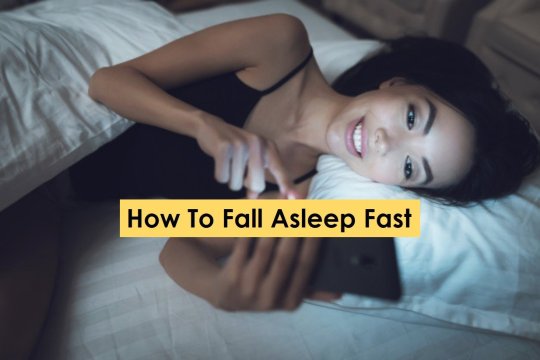
Ever wonder why you can't sleep fast?
So you say you can’t sleep well, and you don’t know why, because you feel good and do all the right things in your life to get a decent night’s sleep. What you don’t know is that you actually don’t do the things that are conducive to getting a solid eight hours, with those needed spurts of rapid eye movement. There are things you do that you are not even aware of that effect you getting the requisite hours in deep sleep mode, and today we are going to tell you what you’re doing wrong.
The Era of sleep deprivation and what it experts reveals

So first of all, you’re not alone. Did you know that in the USA it’s reported that a whopping 60 percent of people have trouble sleeping most nights or even every night? That’s according to the National Sleep Foundation and when it comes to sleep deprivation this organization knows what it’s talking about.
The same study tells us that 43 % of those people rarely or never get a good night’s sleep, well, at least people aged 13 to 64. A lot of those folks say they don’t even get six hours’ sleep a night, and the word on the street is we should get seven to nine hours if we want to feel good.

The effects of sleep
deprivation era is here, and there is one big reason why we seem to be
sleeping less. The reason is technology, with the National Sleep Foundation
reporting that 95 percent of people use
an electronic gadget of some kind right before bed.
Gadgets and effects on sleep deprivation

You watch series or videos just before you intend to sleep? But we are not just talking about phones, TVs are included in the list of gadgets. This is what one expert said about gadget use before bed, “Artificial light exposure between dusk and the time we go to bed at night suppresses the release of the sleep-promoting hormone melatonin, enhances alertness and shifts circadian rhythms to a later hour—making it more difficult to fall asleep.
” We are not saying
don’t use gadgets, but perhaps if you want to get your eight hours and
drift off quickly you might think about not looking at a screen for the two
hours before you intend to sleep.
Using laptops and phones before going to bed

Around 60 percent of people in one study said they use their laptop or phone right before they go to bed, and some of them play computer games which are really not conducive to making yourself tired. Another sleep expert said this about that, “Over the last 50 years, we've seen how television viewing has grown to be a near constant before bed, and now we are seeing new information technologies such as laptops, cell phones, video games, and music devices rapidly gaining the same status.”
You might think it doesn’t affect you at all, but according
to those experts it does and there’s data to back that up. We should add that
the artificial light theory about
keeping us awake is controversial and so more research needs to be done.
Phone alerts are the culprit
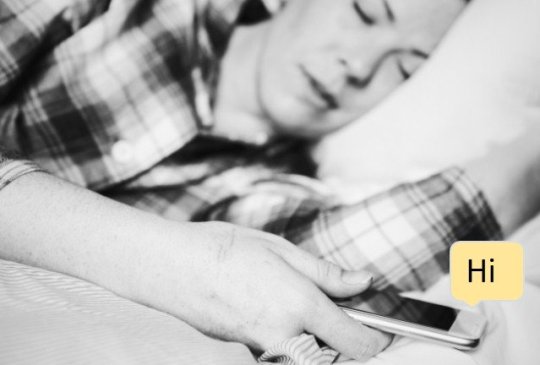
According to studies a lot of Americans leave their phone
alerts on during the night, and one in ten people interviewed said their phone
woke them up during the night at times. Just turn off the alerts, it’s simple
to do.
The problem these days is that many people have online
friends all over the world, so when you’re trying to sleep in the UK your friends in the USA are sending you photos
of kittens on Facebook Messenger. You might have a client in Asia who keeps
posting stuff about work to you when you’re trying to sleep in Canada. You may
wake up and not know why, but often it’s because something went down in that
phone of yours.
Teenagers are mostly affected by not getting a good sleep

Another study said younger folks were terrible at this,
saying that 72 percent of American kids
aged 6-17 go to bed with their phone. In the past kids might have slept
with a furry bear or a book, and those things don't make any noise. Why do
people these days feel they need to sleep
with their phone? What’s so important that it can’t wait?
Are you really that addicted to the thing?

Technology is what
keeping you awake
Co-founder of the Huffington Post, Arianna Huffington, has
said in interviews that this tech
addiction is a major issue and is affecting
the mental health of people. She said the parents are often as bad as the
kids, so they need to start setting a better example. She talks about the dopamine hits we get from technology,
and so scrolling through Facebook right before bed is not a good idea.
When she sleeps there is no technology in her room at all.
You might also get stressed by looking
at social media before bedtime. You really don’t want to get a shot of envy
right before you try and fall asleep.

“Oh, look, there’s my friend on the beach in some country I can’t afford to go to.” This is not what you want in your head before you try and fall asleep.
No electronic screen at least 2hrs before bedtime
Our advice is simple. Do not look at any electronic screens at least 2hrs before bedtime. You might not believe it, but it’s negatively affecting your sleep cycle. If you’re a parent, don’t allow tech in your kids’ bedrooms.

If you’re a kid, wise up and turn that stuff off. Show some self-control ...and if we are
starting to sound like we are giving you a lecture, we should say that we only
just started doing this ourselves. We can tell you that we started to sleep
better.
What else can affect
your sleep besides gadgets?
Now let’s say you don’t use electronic gadgets but still
can’t sleep. You are not depressed or particularly stressed and so don’t know
what the problem is. You haven’t just fallen in love or lost a job. You’re
fine, but sleeping is hard work for you.

You know, it could be those coffees you are having in the
evening, or perhaps those cups of tea. We know those British folks love their
tea and quite a few of them will have a “cuppa”
in the evening, perhaps with their “supper”.

We know this because we’ve seen it firsthand. That cup of
the finest Tetley’s tea could actually be keeping those Brits awake. That cappuccino from Starbucks the American
had at 7 pm could ruin that person’s sleep. This is the lowdown on the drug caffeine. Once you’ve had your hit you’ll peak
around 30 to 60 minutes later.
That buzz will then plateau, but caffeine has a half-life of
five to six hours, meaning this is the time it takes for your body to get rid
of half of the drug. You’ll still have some caffeine in your system for hours
after that.
Consuming caffeine
before going to bed
Now, as you know, it’s not as if caffeine can be compared to
a substance such as ice, the illegal kind, but it is a stimulant. And we should
say that Americans love the stuff, perhaps just as much as those Brits love
their tea. One study we found said this,
“The average daily consumption of caffeine by adults in the U.S. is about 300 mg per person. This is about three times higher than the world average. But it is still only half of the caffeine consumption in heavy tea-drinking countries such as England and Sweden.” Some people like coffee too much, and while there are many positive effects to having that shot of espresso, you can go overboard. In extreme cases, believe it or not, people have died from overdosing on caffeine. In less extreme cases people just feel wired. That might not be so bad in the morning, but at night time it can be a nightmare.
Take away to sleep
well
Sugar, carbs, and fats are the worst things to eat late, so perhaps we’ll forgive you for having one small bite of a banana. This is the conclusion of one article we found, “Eating during bedtime hours – whether it’s a large dinner or a small snack while watching your favorite TV show — while it may seem to help you fall asleep, may actually harm your overall health and metabolism, creating added stress inside the body.”
So, there you go. If you are healthy and not suffering from
some physical or mental disease this might be the reason you are not sleeping
well. It’s really simple advice to follow. Just turn off your gadgets two hours
before bed.
Don’t consume caffeine at least six hours before bed and don’t eat before you sleep.
If indeed you are reading this at midnight with your mouth full of chocolate being cement-mixed with Coca-Cola you are basically creating a perfect storm of bad sleep. Or do you disagree? Tell us what you think in the comments. Also, be sure to like, share with your friends and colleagues who can't sleep at night
Read article - How to stop these hiccups – causes & home remedies
Read article - Is Peanut Butter Ketogenic? Powerful Carbs to Calories
Read the full article
0 notes
Link
Transcript: This transgender Jew is tired of the anti-Semitism in the LGBTI community. After the Chicago Dyke March fiasco, where three Jewish lesbians carrying a Pride flag featuring the Star of David were kicked off the march by organizers for ‘supporting Zionism,’ the issue of anti-Semitism in the LGBTI community has been coming to light. Most recently, the Chicago Dyke March Tweeted using the term ‘Zio,’ a derogatory term for Jews coined by David Duke of the KKK. Many LGBTI advocates, like the organizers of the Chicago Dyke March, are vehemently anti-Israel, claiming the country is participating in an ‘genocide’ of the Palestinian people. One such activist is Pauline Park, a transgender woman associated with the group NYC Queers Against Israeli Apartheid, who often posts publicly about her pro-Palestinian activism, using buzzwords like ‘genocide,’ ‘apartheid,’ and ‘occupation.’ ‘That Pauline has no clue as to what genocide actually is, or what apartheid actually means, is obvious, but it is just as clear that she understands that such terms are trigger words for many whom she claims she is trying to persuade,’ writes Dana Beyer for Huffington Post. ‘That she is willing to defend a terrorist government that, upon meeting her, would ask her to kneel to be beheaded because she is a trans woman is inexplicable.’ ‘Is Israel a paradise for the LGBT community? No, not by a long shot. But it is getting better, and Israeli gay and trans people don’t escape into the West Bank and Gaza; Palestinians do escape into Israel. What is going on in the Middle East — and that includes the terror in Libya, Syria and Iraq, to say nothing about all the other rabidly sexist and homophobic regimes in the Muslim world — is not comparable to several months of demonstration against the LGBT Center of New York. Talk of “homonationalism” and “pinkwashing” as tools to stifle dissent is not just absurd; it is insane.’ Meet the fed up, trans, queer Jew Ariel Lipson is a 20-year-old queer trans man from Seattle, Washington. Lipson identifies as ‘Ay’lonit,’ which is a Jewish term used to describe someone ‘identified as “female” at birth but develops “male” characteristics at puberty and is infertile.’ Lipson began noticing the anti-Semitism of the LGBTI community upon entering high school. ‘The high school I attended was predominantly LGBTQ+, both students and staff,’ he explains. ‘While at the time I was working through my own internalised anti-Semitism, I did notice that being a part of Judaism, and being open about it ostracised me. I had people interrogate me about [the Israel/Palestine conflict], refuse to let me enter the space, and accused me of being complicit in genocide,’ he continues. ‘At this time I was staunchly anti-Zionist. As I got older, I saw the community become more and more cold towards Jews. I joined a youth group, and when I would talk about it, and people found out I was Jewish, they would be startled, and avoid me. I went to a LGBTQ camp, and while it was in general ok, there were moments of Jew = Israel. The main hub of LGBTQ+ space in Seattle is also big on activism, and being Jewish, and not willing to put up with comparisons to Nazi Germany or that your fellows control media/government/etc means that you are not going to be all that welcome in much of the spaces there.’ One moment in particular that sticks out in Lipson’s mind is the day he decided to wear a Star of David to school. ‘I had just bought it, and was so happy to wear it. I went to school, and felt proud. Here I was, accepting myself,’ he recalls. He then remembers having the following dialogue with a classmate: ‘“Oh are you Jewish?” “Yes.” “I had no idea. Sorry to hear that.” “What?” “You’re Israeli, so that means you kill children”’ ‘From that moment on I was shunned by classmates, had my trans authenticity mocked, as being Jewish meant I could not be LGBTQ+ for some reason,’ he says. Now, Lipson is sick and tired of engaging with non-Jewish LGBTI activists who often conflate Zionism with Judaism and utilize anti-Semitic tropes in their activism, such as Pauline Park. After recently being in a heated Facebook argument with Park, who told Lipson and numerous other queer Jews that their perspectives on anti-Semitism were invalid, he has officially had enough. ‘Any activist who behave as Ms. Park does is not an activist,’ Lipson states. ‘If they refuse to listen to a minority asking them to stop using stereotypes, tropes or words that oppress them, then they are not really working towards equality or freedom.’ ‘In short, I am hurt. However I am unsurprised. We saw it in [the Chicago Dyke March], we see it with Pauline Park, we see it with countless activists across the United States, Canada and the Western world.’ ‘As Jews, we have come to expect anti-Semitism in activist and LGBTQ+ spaces. I used to hide that I was Jewish, now I don’t. Is that dangerous? Yes. But it is a way to not only find the spaces that I can feel safe in, but I should not have to hide who I am. I should not have to be a closeted Jew. Being LGBTQ+ is about being proud. How can I be my whole and authentic self if I cannot be open about my ethnicity, people, culture, faith and history.’ Doing better moving forward Lipson believes that one can be anti-Israel without being anti-Semitic. He recommends this guide for how to do so. As for advice for the LGBTI community to be more inclusive of Jewish voices, Lipson says the following: ‘First and foremost, see us a human. View us as peers. We, too, are a minority. We, too, are oppressed. Ours is not just a religious culture, but an ethno-religious culture that stretches back nearly 6,000 years. Throughout that time, we have been oppressed. Our oppression did not begin, nor end with the Shoah. It still permeates today in every corner of the globe. Jews are fleeing France in droves. The last remnants of Syrian Jewry fled their homes not even 5 years ago.’ ‘If you want to be more inclusive to the Jewish LGBTQ+ community, start by listening. Like any other minority that you do not belong to, you do not get to dictate what is, or is not anti-Semitic. You do not get to tell us what our oppression is, or is not. That is for Jews, and only Jews, to decide. Your job is to stop talking, listen, learn, and act upon what you have learned to make your spaces safer for Jews. You do not get to interrogate every person with a Magen David Necklace or a Kippah. You do not get to stop listening to a Jewish person because they are a Zionist. That is not how activism works.’ ‘We do not rule the world. We do not eat babies. We do not sacrifice virgins. We do not run the media. We are real, live human beings. Treat us with respect as you would any other person.’ By: Rafaella Gunz @tikkunolamorgtfo @littlegoythings
#judaism#left antisemitism#anti semitism#anti semitic#antisemitism#antisemitic#Jewish#jumblr#social action#social justice#progressive#left#feminism#inclusive#transgender#article#transcript#Paulina Park#Ariel Lipson
218 notes
·
View notes
Text
Séance 11 : L’actualité sous un nouveau jour
Depuis le début de l’ère numérique, les manières pour la population de s’informer sur le monde a bien changé. De la même manière, il est plus facile d’avoir bonne conscience en partageant des nouvelles qu’on considère importante, en appuyant des causes qui nous tiennent à coeur, de partager et de discuter les nouvelles qu’on tient comme importante ou vraie.
Il y a plusieurs plateformes de nouvelles et de faits divers qui offrent la possibilité à des utilisateurs de publier des textes d’opinion ou des entrevues variées. On pense tous de suite à des sites tels que le Huffington Post, Le Journal de Montréal, LaPresse, etc.. Ces nombreux médias ouvrent la porte à une plus grande démocratisation de l’information puisqu’elle est partout sur le web en plus d’être vulgarisé plus ou moins à l'extrême.
Certains, même, utilisent leur médias sociaux tel un site de pseudo-journaliste ou de publications éditoriaux.
Sur Youtube il se produit un phénomène de présentation de l’actualité par les producteurs de contenu. Pour ma part, le contenu qu’on peut qualifiée ‘’d’actualité’’ auquel je suis abonnée est souvent reliée aux artistes ou vedettes populaires québécoises et américaines, de même que quelques question de débats publics. Parfois en live, parfois en capsule séparé et planifiée, plusieurs podcasts diffusée sur Youtube en version vidéo proposent des invités qui discutent de différents sujets.
La chaîne Rad de Radio-Canada

C’est du journalisme accessible aux plus jeunes, pas stoic dans leurs explications. En étant plus facile, dynamique et intéressant à comprendre, Rad donne la chance à tous d’avoir un accès à de l’information compréhensible. La chaîne permet ainsi une démocratisation de l’expertise pour tous ; autant pour les adolescent, mais aussi pour tous ceux qui ont besoin de précision sur différents sujets qui peuvent être difficile à comprendre dans les nouvelles classiques. Par contre, ici, l’info est résumé en une dizaine de minute… donc ce sont les grandes lignes.
La Chaîne NoJumper

C’est une chaîne d’actualité de l’industrie du hip hop qui présente des interviews avec diverses personnalités publiques, offre la possibilité à de nouveaux artistes de se faire découvrir et forme une plateforme qui permet à cette industrie* de se regrouper dans un espace communs web. *
La chaîne SansFiltre

Ensuite, voici une chaîne québécoise qui invitent différentes personnalités, sois issût du domaine de l’humour, de la télévision, des médias sociaux et même de la littérature. Il s’agit d’interview avec les deux animateurs, ils présentent les artistes, discutent de sujets d’actualité, et se questionne sur les débats de niveau social*.
Le podcast est une nouvelle manière de partager ou de retrouver de l’information sur les personnalités publiques et les sujets actuels. Moins de rigueur qu’à la télévision ou la radio, le podcast offre des discussions vraies, sans contrainte (habituellement) sur les sujets et les opinions abordées. C’est une excellente façon de s’informer ou se divertir sans les normes et les publicités de la télé.
0 notes
Text
Demoncracy

In this blog post will be exploring the wicked and tumultuous wilds that so ever encapsulates America and its political climate. This specific example, sourced from the Satirical Website ‘Burrard Street journal’, breaks a provocative article describing then President Barack Obama’s supposed intention to not abdicate his seat as President of the United States.
The blanket term ‘News’ describes any significant, or even insignificant new information that is considered noteworthy. Since the 2016 election however, strings of elaborate falsehoods have innovated the concept of ‘Fake News’ as political weaponry, with accusations thrown at Facebook for the apparent role Fake News played at getting Donald Trump elected. Allcott and Gentzkow(2017) defines ‘Fake News’ as ‘News articles that are intentionally and veritably false and could mislead readers’.
At a glance this article takes advantage of the vitriol and hatred pointed at by current US President Donald Trump, now since Donald Trump is in fact the current president and Barack Obama did no such thing during Trump’s January inauguration, it is clear that this specific article is not actually true. Instead it is an example of satire being reported and shared as fact. In terms of structure, the article immediately opens with an appeal to authority, with an explanation that the articles information is sourced from a hoax interview between the former President and long time CNN reporter Wolf Blitzer, paired with a hyperlink to the source of said interview, a common occurrence within the written article as a whole. These in text hyperlinks can be interpreted as denoted sources to certain claims within the written article, but in actuality just links to other satirical pieces, sometimes the ones. This usage of hyperlinks as false roundabout sources can be interpreted as true sources to the inattentive, which also lends itself with the generally neutral language presented by the writing of the article outside of the faux Obama’s intentionally incredulous and hypocritical dialogue that may or may not be picked up in the heat of the moment. This article in practicality takes advantage of the polar distinctions between the American Left and Right wing, with people who may resent Obama, of which there are plenty, being roped in into the notion that Obama is a traitor to Democracy, while similarly people who may resent Trump, of which there may be many more, may view Obama’s actions as preserving Democracy in the presence of tyranny.
As previously stated, this specific headline is fake news by circumstance since it was created by a Canadian satirist online publication among other absurd Canada themed incidents concerning the Oval Office. As it stands this article and similarly noted cases of ‘Trump Purchasing Canada’ and ‘Trump building a wall with Canada named the Great wall of Trump’,

were never intended to be taken as fact. The Vancouver Based satirical news website first gained statewide notoriety after publishing the ‘Obama Family moving Canada’ bit that was similarly circulated. Incidentally, while the Burrard street journal is actively self disclosed as being wholly satirical, because some of their headlines have been picked up by other less comic news sources and retreaded and pawned off as fact as a provocative headline. So much so that, Burrard Street founder John Egan, has actively tried to combat the spread of his own material refurbished into click bait.

This specific article does hold significance as a common subject that does tend to resurface per election cycle. As of now even, as recently in February of this year, a headline published on several major news outlets including, but not limited to: The Huffington Post, The Independent, Vox Media and the CNBC, detailed Michael Cohen, Trump’s former lawyer and former vice-president of The Trump Organization, and his proclamation that Trump is not likely abdicate peacefully. Potential biases aside an article like this subsequently mirrors the expected fears within the US that a reigning president will void the concept of democracy and implant themselves as Dictator, Ala Julius Caesar. Regardless of Trump's personal qualities, it's unlikely that he or any President for the matter would successfully hold out in the White House before being removed by the secret service.
Now in retrospect, this satirist piece published by the Burrard Street Journal and all of the websites similarly themed articles’ facade generally gets broken the moment someone reads the article themselves. Of course, the possibility of an individual who may read the contents and still believe otherwise will always exist, but In my opinion that's not exactly a satirist website clearly labeled as so’s problem anymore. However because of the medium of endless reposting that occurs within social media, context will invariably disappear as secondary News sources begin to feed into the dichotomy of Headline click-bait. Such is the power of the Headline.
(2017, January 25). President Obama Confirms He Will Refuse To Leave Office If Trump Is Elected. Retrieved from https://www.burrardstreetjournal.com/obama-refusing-to-leave-if-trump-elected/
Solon, O. (2016, November 10). Facebook's failure: did fake news and polarized politics get Trump elected? Retrieved from https://www.theguardian.com/technology/2016/nov/10/facebook-fake-news-election-conspiracy-theories
Allcott, H., & Gentzkow, M. (2017). Social Media and Fake News in the 2016 Election. The Journal of Economic Perspectives,31(2), 211-235. Retrieved from http://www.jstor.org.ezproxy.waikato.ac.nz/stable/44235006
(2016, July 12). Donald Trump Claims He Will "Buy Canada" if Clinton Gets Elected. Retrieved from https://www.burrardstreetjournal.com/donald-trump-claims-he-will-buy-canada/
(2016, August 3). WATCH: Donald Trump to build wall with Canada (Exclusive video and details). Retrieved from https://www.burrardstreetjournal.com/donald-trump-to-build-wall-with-canada/
Azpiri, J. (2016, December 13). B.C. satirical news website founder takes on fake news sites that 'copied my articles'. Retrieved from https://globalnews.ca/news/3123282/b-c-satirical-news-website-founder-takes-on-fake-news-sites-that-copied-my-articles/
Clark Mindock New York @ClarkMindock. (2019, June 16). 'It would ultimately come down to the use of force': What would happen if Trump refused to leave office after 2020 loss? Retrieved from https://www.independent.co.uk/news/world/americas/us-politics/trump-impeachment-refuse-leave-office-nixon-cohen-white-house-a8814991.html
0 notes
Link
#tessa#off ice#ambassadorship#air miles#interview: huffington post canada#moire sounds more romantic
250 notes
·
View notes
Text
Why the Media Went Crazy for Keto Crotch
youtube
“Your Meat-Heavy Diet Might Be Giving You ‘Keto Crotch,’” an article1 on munchies.vice.com announces, claiming “Doctors have confirmed that changing your diet can create new and interesting smells … down there.” “'Keto Crotch’ Might Be the Strongest Argument for Eating Carbs Yet,” Emily Alford reports on Jezebel.com.2
“'Keto Crotch Is the Seriously Smelly Side Effect of the Popular Diet,” the New York Post declares,3 and then goes on to confuse diabetic ketoacidosis — which causes bad breath — with nutritional ketosis achieved through a ketogenic diet. (The two have absolutely nothing to do with each other, as explained in my interview with Dorian Greenow and on ketogenic-diet-resource.com.4)
Countless other mainstream and not-so-mainstream news sources suddenly carry similar headlines, warning people that going keto can cause stinky discharges that will render you a social outcast — and that eating high-sugar foods like fruit juices and whole grains is the answer to these offensive odors.
Remarkably, an online search for the term “keto crotch” on the day of this writing produces an astounding 2,060,000 results. The question is, where’s the proof to support this nonsense?
The Rise of 'Keto Crotch’
From what I can tell, the term “keto crotch” initially appeared on a reddit discussion board back in 2014,5 and again in 2016,6 and many of the articles now discussing this issue appear to be referring back to these brief anecdotes.
Since then, and up until February 24, 2019 — when Delish.com published Korin Miller’s article,7 “'Keto Crotch’ Might Be a Surprising Side Effect of a Low-Carb Diet,” republished that same day on Yahoo Finance with the more eye-catching headline, “'Keto Crotch’ Is the Most WTF Side Effect of Going on the Diet”8 — the term “keto crotch” was virtually nonexistent as far as I can tell, after digging through about a dozen search pages.
Miller, who appears to be one of the first journalists to use the catchphrase “keto crotch,” is a freelance journalist whose work has appeared in a number of health and women’s magazines.
She’s also an SEO consultant and founder of the SEO company keepUP Marketing9 that helps websites optimize their search results, and is the managing editor of the StyleCaster Media Group,10,11 a “leading digital media and technology platform for fashion, beauty and lifestyle.”12 With these qualifications, it would seem reasonable to assume she has the know-how to make a story go viral. The reason why is a question that has yet to be answered.
The story started spreading the very next day, and by February 28, keto crotch articles were “everywhere.” Yet not a single scientific study is brought forth in these articles, and a search of the medical literature turns up nothing. In fact, Miller’s February 24 article specifies there’s no medical evidence linking nutritional ketosis to foul-smelling private parts.
Who Are Some of the Health Experts Commenting on 'Keto Crotch’?
Articles do, however, cite several health care providers, among them registered dietitian and nutritionist Lisa DeFazio13 — whose commentary appeared in multiple news stories within 48 hours14 — gynecologist Dr. Lauren Streicher and dietitian Andrea Hardy.15
DeFazio offered a link to a 2009 study16 in the Journal of Nutrition when questioned by a Twitter follower about the basis for her concerns, which found bacterial vaginosis was most prevalent among women who had the highest dietary fat intakes.
Streicher’s comments, on the other hand, have been far more neutral, noting that dietary changes will temporarily alter the pH in the vaginal area in general, and that there’s no medical evidence linking the ketogenic diet with infections or other odor-causing vaginal ailments. Huffington Post writes:17
“'When I got the first call asking about this, I asked if they were making this up to write a story,' Lauren Streicher, medical director of the Northwestern Medicine Center for Sexual Medicine and Menopause and clinical professor of obstetrics and gynecology at Northwestern University’s Feinberg School of Medicine, told HuffPost with a laugh.
Streicher said that while it’s certainly possible that diet can have an impact on vaginal health, there is no scientific evidence to prove it, and myriad of potential causes for odor to exist.”
The problem with the study18 cited by DeFazio is that the women also had high carb intakes, and carbs are primary drivers of infection and yeast. According to the authors of the study:
“[T]he mean [energy intake] exceeded the recommended daily allowance for adult women. Also, the energy, fat, and carbohydrate intakes of the women were considerably higher than those reported in NHANES (1999–2000) for women of comparable age.”
In other words, it appears these women were eating a standard American diet high in both fats and carbs, so the results cannot be attributed to a high-fat, low-carb diet such as the ketogenic diet. Not surprisingly, DeFazio recommends eating carbs to lose weight and keep it off, saying “low carb diets don’t work long term.”19
DeFazio also welcomes media inquiries, stating she’s “available for all magazine, newspaper, radio, television and website interviews,” and “will accommodate you ASAP, even on short notice.”20 She’s also a talent with Taylor Talent Services,21 which specializes in “Helping brands, producers and marketers find the face of their products.”22
Ketogenic Experts Have Never Heard of 'Keto Crotch’
Ketogenic experts, on the other hand, myself included, have never heard of this complaint before now. In the video above, Dr. Ken Berry,23 a self-proclaimed “keto friendly” medical doctor, shares his views on the topic.
As noted by Berry, carbs are in fact the primary driver of yeast infections, vaginosis, bladder infections and similar ailments, and women who struggle with these conditions who switch to a low-carb diet universally improve. “There’s nothing about the ketogenic diet that’s going to make you have vaginitis or vaginosis,” he says. “It just makes no sense whatsoever.”
Kristie Sullivan, Ph.D.,24 who has been on a ketogenic diet since 2013, and has spent years coaching people on the ketogenic diet, shared similar views:25
“In nearly six years of following a strict low-carb diet, and interacting with literally hundreds of thousands via social media and my Facebook groups (over 250,000 people … ), I have interacted in nearly every discussion imaginable regarding personal health and low carb or keto.
Not once has the issue of foul vaginal odor been part of that conversation. Bad breath or changes in body odor are not uncommon concerns, but those tend to be experienced early in the adaptation phase and are not long term or ongoing issues.”
Another ketogenic expert, Megan Ramos, CEO of Intensive Dietary Management in Toronto, Canada, said in an interview:26
“We’ve treated over 10,000 patients at this point. Approximately 65 percent of them are females. Not once did I have a woman bring up this issue with me.
As a matter of fact, we’re seeing the opposite: women have less and less yeast infections and bladder infections, in particular our diabetic patients who normalize their blood sugars, and who stop taking their SGLT2 inhibitors (which is a drug that makes people pee out sugar).”
Where Did Keto Crotch Story Come From?
Considering the complete lack of scientific evidence to support claims that nutritional ketosis can cause vaginal infections, one has to wonder where this story originated from. After all, some arbitrary anecdote simply won’t spread like wildfire for no reason, being picked up by major media simultaneously. Yet here are dozens of near-identical stories being featured in different magazines and news outlets on the same day.
Two individuals have stepped forward with an answer. In the video above, Berry explains how, when browsing through several women’s magazines in a bookstore that carried the keto crotch story, he noted a curious pattern. Each of them had full-page ads for Weight Watchers, whose stock prices, incidentally, have plummeted by 80 percent since July 2018 — a drop attributed by Weight Watchers to the mass adoption of the ketogenic diet.27 In his video commentary, Berry says:
“Rest assured … we see less and less things that could give you changes in odorous discharge when you eat keto. You don’t get more of that, you get much, much less …
So, I think keto crotch is just the latest myth [pushed by] the big publishing houses who get a lot of their ad dollars from Weight Watchers and Biggest Loser and Jenny Craig. They would love for you to stop eating keto …
[I]f they can scare you with the latest scare tactic, which is 'keto crotch,’ then they’re successful and they’re going to get more ad dollars from the big, carbohydrate pushing weight loss programs.”
John Zahorik, a self-described “nutrition explorer,”28 has taken his investigation a step further. In a series of Twitter posts (this thread reader29 offers the easiest to read view), Zahorik shows the links between Weight Watchers, its PR company Edelman,30 some of the primary health experts interviewed about keto crotch, as well as some of the authors of these nonsense articles, Shireen Khalil31 among them.
'Keto Crotch’ — A Secret Weight Watcher’s PR Stunt?
September, 2018, PR Week announced “Weight Watchers turns to Edelman to handle global consumer PR.”32 According to PR Week, “Weight Watchers wants to strengthen its reputation, better define and grow 'the Weight Watchers impact,’ and increase revenue to more than $2 billion by the end of 2020 …” Other clients of Edelman include pasta giant Barilla,33 and The Coca-Cola Company.34
According to screenshots taken by Zahorik, Khalil, Streicher and DeFazio are all Edelman PR followers on Twitter.35 While that certainly doesn’t prove they’re working together, it suggests collaboration is a possibility. He also reminds people about the reality that is “native advertising” — marketing designed to look like news.36 As reported by Conently.com in 2015:37
“Native advertising — articles paid for and/or written by a brand that live on a publisher’s site — has emerged as a powerful and popular new advertising tool over the past few years.
Media companies like BuzzFeed, The New York Times, The Wall Street Journal, and The Atlantic have all invested heavily in the creation and distribution of native advertisements on behalf of brands, with many charging over $100,000 for a native advertising campaign.”
Indeed, PR companies not only create recognizable ads and native advertising (ads not recognized as such), they also do news placement on behalf of their clients. In many cases, such news stories will feature actual science that happens to benefit the client’s position.
In this case, however, the “news” is anything but. It’s pure fabrication, and appears to be aimed at implanting a highly memorable mnemonic device38 into the public consciousness. After seeing the term “keto crotch” hundreds of times, you’d be hard-pressed to not instantaneously think of a stinky crotch every time you hear “ketogenic diet.”
Already, people have made comments on social media saying the mere possibility of this malodorous condition has dissuaded them from going keto, and there’s little doubt this is the exact aim of this fake news campaign.
Zahorik points out the Edelman firm is in fact a master at creating these kinds of viral campaigns, a key part of which is “Leveraging top-tier influencers to integrate a brand’s key messaging directly into the content target audiences are consuming” (per tweet from Edelman39).
“The thing that made this campaign different from typical 'branding’ efforts is that this was a SECRET effort to DESTROY the brand of the COMPETITION,” Zahorik writes.40“What was the source of this alliterative affliction in these 'articles’? Answer: People on the internet were talking!”
Big Business Is Clearly Afraid of Keto Success
While the evidence implicating Edelman and Weight Watchers in the creation of this “keto crotch” myth is still circumstantial, the timing sure seems suspiciously convenient. The very same day the keto crotch myth exploded on the internet (February 28), CNN Business reported on Weight Watchers’ financial demise, stating:41
"CEO Mindy Grossman attributed the problem to the keto diet, a popular eating regimen that makes bread and other carbs taboo. She said during a call with analysts … that keto is 'becoming a cultural meme’ and she even called it a 'keto surge.’“
Let’s face it, the media is owned by industry, and leveraging of social media influencers can make fake news and unsubstantiated claims like this spread like wildfire. While there’s no evidence to support this obnoxious story, there’s an incredible amount of published literature showing the health benefits of a ketogenic diet.
For example, ketones have a biological impact similar to that of fasting,42 including accelerated autophagy and mitophagy, improved glucose metabolism, reduced inflammation, clearing out malfunctioning immune cells,43 and reduced IGF-1 (one of the factors that regulate growth pathways and growth genes and is a major player in accelerated aging and cellular/intracellular regeneration and rejuvenation).
Ketogenic Diet Basics
I strongly believe adopting a cyclical ketogenic diet — which means after you have achieved metabolic flexibility, you cycle in and out of eating foods high in healthy fats, with moderate protein and low net carbs (think nonfiber carbs) — can benefit most people. It’s very effective for weight loss, and as discussed earlier, works with your body in such a way as to improve regeneration and renewal.
Maintaining net carb (total carbs minus fiber) intake at or below 50 grams allows you to enter into nutritional ketosis (the metabolic state associated with an increased production of ketones in your liver, which is the biological reflection of being able to burn fat). However, we are all different in how we respond to foods, so expect this amount to vary from person to person.
Some people can be in a full fat-burning state with full ketosis at a level of nonfiber carbs that’s higher than 50 grams, sometimes even as high as 70 or 80 grams. However, if you’re insulin resistant or have Type 2 diabetes, you may need to limit your net carbs to as little as 20 or 30 grams per day.
To find your personal carb target, it’s important to measure not just your blood glucose but also your ketones. One of the most accurate and least expensive ketone measuring devices on the market right now is Keto Mojo. This will give you an objective measure of whether or not you’re truly in ketosis, rather than just relying on counting the grams of carbohydrates you consume.
Using a nutrient tracker will radically improve your ability to understand your ketogenic diet nutrient targets and assess the nutrient value of your food choices. There are a number of trackers available, but my first choice is Cronometer.com/Mercola. That’s my revision of the basic Cronometer tracker, and it’s already set to default to macronutrient levels that will support nutritional ketosis.
Once you’ve confirmed that you’re in ketosis, start the cycling procedure described earlier, where you add in higher net carbs and protein once or twice a week, ideally on days you’re strength training. Intermittent fasting works very well with a ketogenic diet as well, and can further speed up and optimize your results. You can learn more about the benefits of a ketogenic diet from my books, ”Fat for Fuel,“ and ”Ketofast.“

>>>>> Click Here <<<<<
from Articles http://articles.mercola.com/sites/articles/archive/2019/03/18/keto-crotch.aspx
source https://niapurenaturecom.tumblr.com/post/183534844866
0 notes
Text
Ways to Ease Heartburn Pain Without Taking Pills
One kind of indigestion medicine can cause medical issues whenever utilized on a long haul premise. Here's some approaches to ease heartburn with way of life changes.

Proton siphon inhibitors (PPIs) are a generally recommended class of medications for individuals encountering indications of heartburn.
In any case, an ongoing report found that utilizing these medications on a long haul premise could be www.heartburnnomore.co.uk connected to an abbreviated life expectancy.
The examination, driven by senior creator Dr. Ziyad Al-Aly of the Washington University School of Medicine, pulled information on about 3.5 million individuals from a national U.S. Bureau of Veterans Affairs database.
Specialists thought about various gatherings of individuals: the individuals who utilized PPIs and the individuals who utilized histamine H2 receptor rivals (H2 blockers), alongside individuals who didn't utilize either.
Altogether, the individuals who utilized PPIs had a 25 percent higher danger of death from all causes versus individuals who utilized H2 blockers.
The information is in accordance with other detailed dangers of long haul PPI use, including a conceivable expanded danger of bone breaks, the improvement of minute colitis, and a higher weakness to pneumonia.
It's important that PPIs are commonly very much endured when taken on a transient premise.
At the end of the day, for those encountering heartburn, there are various straightforward approaches to decrease indications — no solution required.
Is it heartburn?
The best practice for anyone encountering heartburn side effects is to counsel with their specialist, says Dr. Brenna Velker, a family doctor and extra teacher at Western University's Department of Family Medicine in Ontario, just as a blogger at the Huffington Post Canada.
"There are sure things that can cause reflux or gastroesophageal reflux sickness (GERD) and you would prefer not to treat the side effects without settling the issue," Velker told Healthline.
"On the off chance that someone is utilizing a great deal of nonsteroidal calming drugs like Advil, they can harm the covering of the stomach and cause bothering, agony, and reflux," she proceeded. "So first thing we would state is in case you're taking something to that effect, stop. Second thing is there's really microscopic organisms called Helicobacter pylori that can cause reflux and GERD, so if that is a plausibility, we'd presumably need to watch that with blood work just to ensure that they're not positive. In the event that they are, at that point treating with against reflux drugs, even a PPI, won't fix the issue."
After interview with a specialist, if the obvious manifestations of heartburn are, truth be told, indigestion and not something progressively genuine, there are various approaches to facilitate the torment that don't include taking physician recommended prescriptions.
0 notes
Text
Facebook Matters to Some More Than Others (Media Switch-Up Three
Despite all of the backlash this social media application has received lately, there are people who still get on Facebook. If you aren’t aware of the backlash it is all thanks to a privacy scandal that occurred last month. According to news outlets, the app was accused of granting large companies such as Spotify and Netflix access to users’ data without permission. The article below gives more detail in regards to the incident:
https://www.usatoday.com/story/tech/2018/12/19/facebooks-latest-privacy-scandal-what-we-know-now/2361257002/
Although Mark Zuckerberg and his team were in hot water from the incident, which led to thousands of users (specifically millennials) to delete their page, the app continues to sky rocket as the leading social app there is. In fact, it was reported that there were over 2.3 billion active Facebook users 3rd quarter 2018.
Since Facebook launched, I’ve had two Facebook accounts. My first one, which now no longer exists, was my muse when Myspace went down the drain. My friends and I used the app to communicate with each other when we weren’t in the same class period in high school. We also used it to post photos from the first day of school, weekends out, and even prom; photos in which were not inappropriate for people to see. During that time, I friended all people who were in the same age category as me (millennials), but since then, times have changed. I now use my Facebook to network with those who I haven’t seen or spoken to in years. I also use my Facebook to see inspirational videos and posts. I even use my Facebook to join different groups that’ll be beneficial to my career. Half of my friends list, however consists of adults (my parents, family members, preachers, and even people who can help me get a job in my field.) Because of that, I have distanced myself from the app. Not because of what I would post, but because of what I would see on my newsfeed that isn’t news worthy.
Facebook went from being the outlet for millennials to being the gossip column and “business spreader” for baby boomers and gen-x. For a while, the majority of Facebook users were from the generations, now studies show that our generation takes over Facebook news feeds.

To me, Facebook brings negative energy because people do and say crazy things for “likes” and “shares.” Instagram is more of a positive setting for me simply because people can post negative things on there but I am still able to find a photo, tutorial or quote that’ll lift up my spirit and bring positivity into my world. Facebook is a different place. Facebook users I friend will post things such as “Post a picture in my comments section and I will rate you on a scale of 1-5,” or they will post about their every move “I am getting drunk and....” not knowing that everyone, including potential employers can see it. Instagram’s privacy settings, to me, are more secure than Facebook. Proof: personal experience.
April 2016, my friends and I had just received word that we had been selected as interns at Duke University. I remember going to visit my professor/advisor/mentor to talk about who made it and who didn’t. There was one student that they loved so much and they decided not to pick her; it was her Facebook that didn’t land her the job. I remember seeing how angry and disappointed my professor was because they were rooting for her; she was embarrassed simply because we were put at a higher standard and expectation going into these interviews. This young lady didn’t think that one older post that said, “I’m so h***y, I want f*** and s*** on something,” would result in a missed job opportunity. Honestly, it wasn’t expected from her being as though she was a Magna Cum Laude student. It was a shock to all of us. The moral of the story is not to just watch what you put on Facebook, but watch what you post period.
Of course millennials run social media, however adults aren’t any better with controlling themselves on there either. In 2017, it was reported that 84% of Facebook users are between the ages of 30-49, 72% are between the ages of 50-64, and 62% are 65+. Data also shows that women use the app more than men.

Americans though are not majority of Facebook users in the world. In fact, studies show that Asia and the rest of the world made up most of Facebook’s users than the US/Europe and Canada 4th quarter 2018.
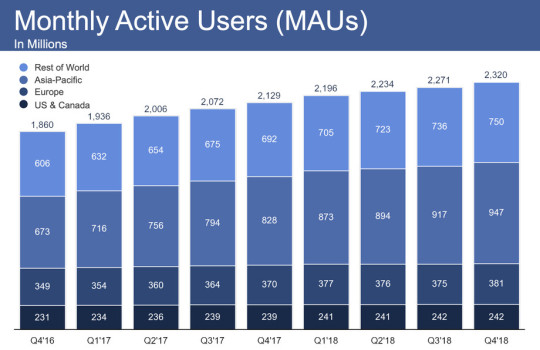
Although Facebook is popular to some, it is not to others. Users, like myself, would rather use something else and make Facebook the last resort. Some brands though don’t feel that way. Studies show that Starbucks, Coca-Cola, and Oreos are the top three brands that have over 10 billions fans.
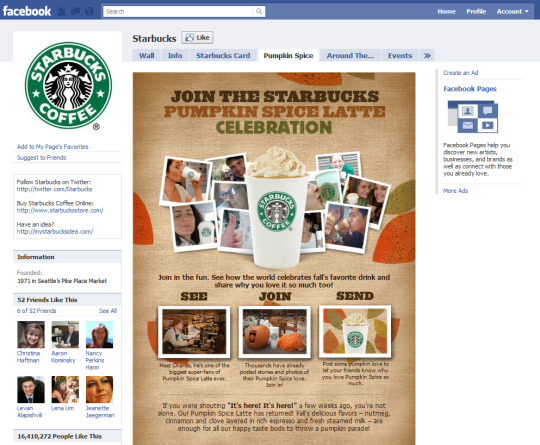
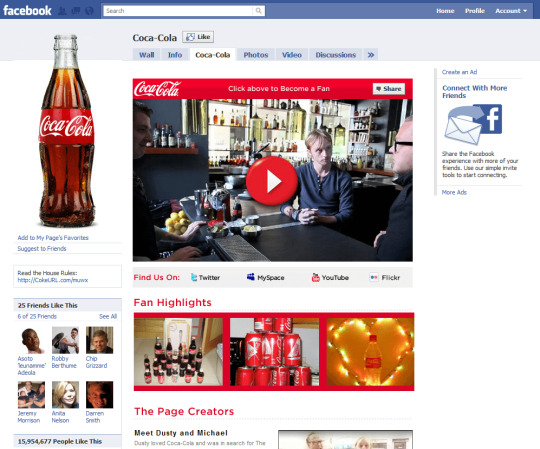
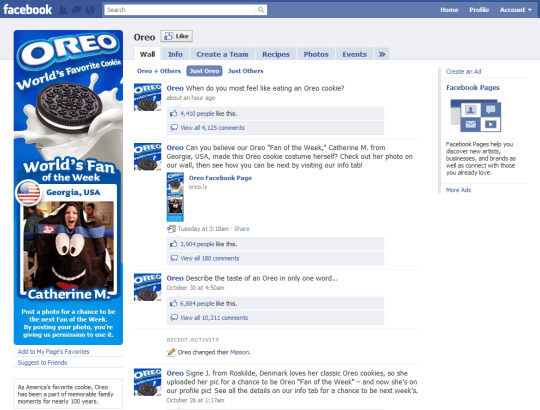
In 2015, it was reported that Fox news, Huffington Post, and ABC news were the three largest news pages with over 100 billion fans. Details follow here: https://blog.crowdtangle.com/the-biggest-news-pages-on-facebook-in-2015-c429f9307a8f
0 notes
Text
Co-ops Offer Family-Friendly Housing, Yet Face an Uncertain Future

Yuri Artibise in his home at the First Avenue Athletes Village Housing Co-op (Photo: Globe and Mail)
I am writing a short series, “Cities for Families” to showcase how local governments, non-profits, and the private sector are building a family friendly city. This fourth and final edition spotlights the non-profit sector, examining how the Co-operative Housing Federation of BC and other partners achieved this goal with the First Avenue Athletes Village Housing Co-operative .
Imagine living in a place where you know all of your neighbours and have weekly dinners together; you leave your front door open in the evenings; your children play freely in a shared courtyard; your rent is affordable; and your housing is secure.
This is the lifestyle for residents of Vancouver’s First Avenue Athletes Village Housing Co-operative.
“When I moved here, I found a stable home that I could afford in a walkable neighborhood that I share with a supportive community,” said Yuri Artibise, a director of the Co-operative Housing Federation of British Columbia and resident at the Co-op. “The combination of people, place and price make it hard to think of living anywhere else.”
The Athlete’s Village Housing Co-op provides 84 homes in Vancouver’s Olympic Village neighbourhood. It was created in 2012 by the City of Vancouver and the Co-operative Housing Federation of BC with a mortgage from Vancity, a local credit union, to help cover a 60-year lease on the land and building.

The courtyard of First Avenue Athletes Village Housing Co-op.
It is one of the 2,220 housing co-operative associations across Canada. A housing co-operative -- or "co-op" -- is a multi-unit housing property owned by its residents. Co-op members have security of tenure, which means they can live in their home for as long as they wish. They are safe from being evicted due to landlords selling or renovating the property - a growing problem in Vancouver.
They also own their homes co-operatively with their neighbours, forming a community that works together to manage the co-op. Like homeowners, they have a say in decisions that affect their home. According to Yuri:
“People living in co-op housing are members and are responsible for the co-op. There is no landlord. As members, they elect a board of directors to manage co-op business and work together to keep their housing well-managed and affordable.“
According to CMHC, having co-op residents involved in decision-making gives them dignity and pride in their homes. For example, they are more likely to take care of their units and common spaces. Higher tenant satisfaction leads to a more stable tenant population and reduced operating expenses, which helps the co-op remain an attractive, livable residence.
Affordable stable homes with solid community support make co-op housing highly desirable for families - 62% of housing co-op units are occupied by parents with children. However, demand for co-op housing is rapidly exceeding the available supply, and the future of co-ops in Canada is still unclear.

Kid’s garden at Vancouver’s Creekside Housing Co-op (Photo: Creekside Housing)
Living Co-operatively
When visiting a co-op housing development, the strong sense of community is palpable. I met Yuri Artibise recently for a tour of the Athlete’s Village Housing Co-op, where I was welcomed into an large, open lobby with a colourful collage of paintings, each one created by its residents.
“The walls were filling up with art from all of the children here, so we decided to have residents provide one work of art and create a collage,” said Yuri. “Our lobby is always busy. It serves as a community space and is usually full of kids playing, especially on rainy days.”
The building’s other shared spaces include a roof-top garden, library, art room, onsite daycare and a courtyard playground. These gathering places form the heart of the community for residents, who organized 131 events in 2016 (including books clubs, clothing swaps, a garden harvest potluck, family movie nights, a kids camp out, yoga classes, and a ukelele circle). This may be a bit much for some, but it’s perfect for many young families and people looking for a close-knit community.
“For five years I lived in a high-rise in downtown Vancouver and I don’t think I ever got to know even one of my neighbours,” says resident Natasha Coulter. “I have met just about everybody in this co-op in the eight months I’ve lived here.”
“You need to want to be part of a community,” said Yuri. “I've heard in other co-ops that some members find the governance structure can be a bit restrictive, but I like the shared decision-making and community cooperation.”
The co-op is located in the heart of Vancouver’s Olympic Village, so residents have access to a walkable, bikable new community along the city’s seawall with public transit, shops and services all within a 5-10 minute walk.
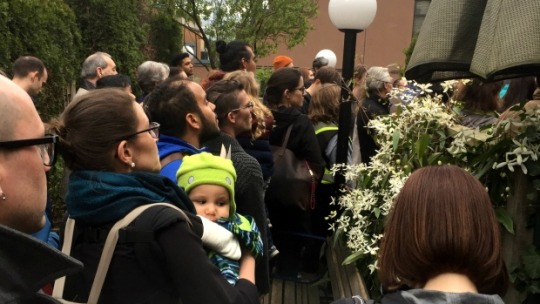
Hundreds of people lined up for an opening at a Vancouver housing co-op.
High Demand and an Uncertain Future
The 1970s to the early 1990s were a period of rapid growth for Canada’s housing co-ops. Most co-ops built during this period were under government social housing programs targeted to people with low to moderate incomes. The legacy of those programs remains: there are 91,846 homes in 2,220 co-operative associations across the nation, according to the Co-operative Housing Federation of Canada.
Today, the future of co-op housing in Canada is uncertain. By 2020, Canada Mortgage and Housing Corporation will have ended its agreements and rental subsidies with co-ops (about 55,000 units across the country). That means low and fixed-income residents — many seniors, single parents, people with disabilities, and new Canadians — will no longer be subsidized.
"This will be a crisis for thousands of families in B.C. who will not be able to afford the full market rent of their co-op homes. It is also a crisis for the co-ops because these are members of their communities who will have to leave," said Fiona Jackson, communications director of the Co-operative Housing Federation of B.C, in an interview with the Huffington Post.
In spite of an unstable supply, the demand for co-op housing remains high. A few months ago, hundreds of people lined up for an opening at a co-op in Vancouver’s Mount Pleasant neighbourhood.
Thom Armstrong, the executive director of the Co-operative Housing Federation of B.C., said that many co-ops in the city have become so popular, they've had to eliminate their wait lists altogether.
"Co-ops are telling us that their waiting lists are sometimes one, two — even three years long," Armstrong said.
Housing affordability is at crisis levels for major Canadian cities like Vancouver and Toronto; and, there appears to be more government appetite for supporting all forms of affordable housing, including co-ops. According to Yuri, the tide is finally changing.
“After a generation of disinvestment in co-ops, all levels of government are showing interest again. But, the majority of the co-op sector realizes that there won't be a return to 1980s-style government housing expenditures.”
Community Land Trusts: The Way Forward?
Canada is now moving into an era where there will be many different types of housing co-ops. In British Columbia, this includes delivering more co-op housing through a Community Land Trust, a non-profit society launched in 2015 with the goal of acquiring, creating and preserving affordable housing across the province.
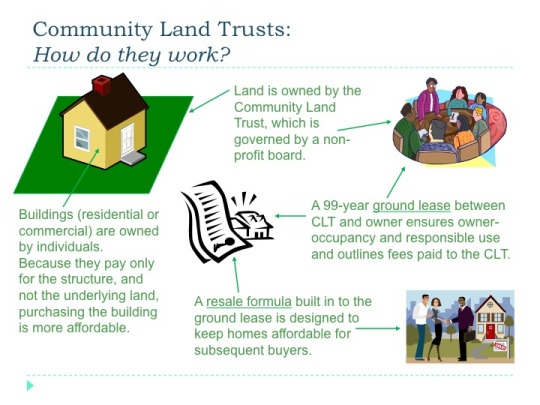
The Community Land Trust currently has 358 homes on four sites under construction in the City of Vancouver on land leased for 99 years. Rents for these homes will average close to 25 per cent below market and more than half of the housing (182 two and three bed homes) will be for families.
There is also a lease-to-own model offered to residents, where they can pay a rental rate to the Land Trust for a period of time, after which they may choose to purchase the unit with a portion of the rent paid to date. The objective of this model is to help low-income households move into home ownership.
“There is an opportunity for Community Land Trusts to be used across the housing spectrum - from social housing to rental housing to co-ops to home ownership. It could be the foundation for an Canadian affordable housing strategy based on social innovation of the best kind: creating housing that is owned by the community,“ said Yuri.
“A community land trust keeps everything that is precious about publicly-owned housing — community ownership, transparent management, and homes that are affordable forever,” said social housing advocate, Joy Connelly.
Co-ops currently house tens of thousands of families across Canada and home ownership is becoming unattainable for many of them. Now is the time to apply innovative ideas like Community Land Trusts across the affordable housing spectrum, offering families greater stability and a supportive community.

Vancouver Mayor Gregor Roberton in front of a new co-op under construction as part of the city’s Community Land Trust.
#citiesforfamilies#co-op housing#co-op#vancouver#Canada#family friendly cities#kids in the city#affordable housing
4 notes
·
View notes
Text
Interview with Betty Moon
We had the pleasure of interviewing Betty Moon over Zoom audio!
As a songwriter, music and film producer Betty Moon lives and works in Los Angeles California where she operates Evolver Music Inc. Her music has been featured in a variety of television shows and films including Californication, Dexter, Bounty Hunters, Teen Mom, Walking the Dead, Last Gasp and the upcoming film Butter starring Mira Sorvino.
Moon’s first album deal was with A&M Records, and her self-titled debut LP was released with multiple award nominations while living and touring throughout Canada. Music from her 2019 album ‘Hellucination’ was on the ballot for this year’s GRAMMY nominations with nods for Best Solo Performance and Record of the Year. Hundreds of respected media sources have featured and reviewed Moon’s music including Billboard, Exclaim!, Huffington Post, Celebmix, Ask Men, Rawckus and more. Her latest collection of songs, "Little Miss Hollywood" is out now!
We want to hear from you! Please email [email protected].
www.BringinitBackwards.com
#podcast #interview #bringinbackpod #foryou #foryoupage #stayhome #togetherathome #zoom #aspn #americansongwriter #americansongwriterpodcastnetwork
Listen & Subscribe to BiB
Follow our podcast on Instagram and Twitter!
source https://bringin-it-backwards.simplecast.com/episodes/interview-with-betty-moon-ZquwnvOY
0 notes